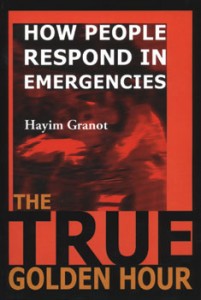The True Golden Hour: A Book Review
The True Golden Hour, How People Respond In Emergencies is written by Professor Hayim Granot. Once a researcher at the University of New York, Granot now resides and works in Israel and has provided a significant contribution to the School of Social Work at Bar-Ilan University in Israel. He established the Mass Emergencies Project, which focused on “applied solutions for human problems in emergencies and disasters.”
In The True Golden Hour, Granot documents his research on human behavior and patterns including physical, mental and psychological elements when faced in natural and manmade disasters, from both his direct experience during the Gulf War and extensive research. I was fascinated with Granot’s accounts of the Gulf War, World War II, Lebanon War and other events, as well as his analysis of why and how humans behaved during these emergencies. Overall, I found the book a quick, interesting, reaffirming and predictable read, and I would recommend it.
Granot strategically approaches this chaptered book in an outlined and organized fashion by addressing an event itself (e.g., scud missiles), the human behavior (e.g., anxiety, fear, immunity) and other factors surrounding an outcome (e.g., flee, stay, military intervention). He begins each chapter by thoroughly addressing the topic, then ending with a summary followed by references and further readings.
I was personally drawn to Chapter 9, “Evacuation.” The chapter starts with a situation within Tel Aviv during the 1991 Gulf War. In my mind, I could see what was occurring, and I found myself nodding in agreement with the decision of civilians to first protect their families by moving out of the war zone. Granot uses the stressful situation that was caused by this event to address the need for formal, clear evacuation plans.
This format allows for an interesting read that draws you into the next chapter. The historical events Granot cites are important references that tie together the overall lessons history has shown us on how humans behave during emergencies. I would recommend this book as a lessons-learned tool for emergency disaster preparedness officials who are looking to develop and document strategic plans for large-scale emergencies within their municipalities.
About the Author
Olivia Gasca is vice chair of the APCO Editorial Advisory Committee.
Orginially published in Public Safety Communications, 75(8):97-99, August 2009.


